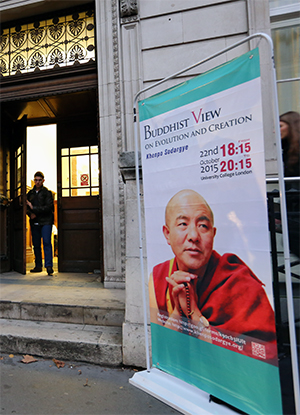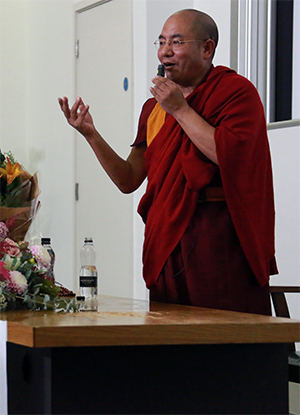Buddhist View on Evolutionism and Creationism
Do you really think that your ancestors were monkeys? If Buddha meets God and Darwin in the UK, what will they argue about the origin of human beings? Will they agree on anything? Khenpo Sodargye presents his opinion on evolutionism and creationism in this talk.
Evolutionism and Internal Consciousness
Excerpt 1: Evolutionism and Internal Consciousness
Today, I was introduced to a book called Evolving Mind: Buddhism, Biology and Consciousness written by Robin Cooper. The author emphasized that evolutionism is great, but there is also a lack of study on consciousness. I really agree with him.
Excerpt 2: What Is Most Important for Everybody Now?
For academia, it’s fitting for them to pursue their scholastic research on the origin of life, the development and destiny of human beings, and so on and so forth. However, for the majority of people, their crucial endeavors should be on finding ways to get rid of suffering and attain happiness. There is an analogy in the Arrow Metaphor Sutra: A young man asked the Buddha fourteen questions, such as how the universe began and how it would end. Although having answered such kind of questions elsewhere, the Buddha instead told the young man a story. He told that if a man was wounded with an arrow thickly smeared with poison, should the man pull out the arrow right away or should he wait to find the answers as to what the origin of the arrow was, what it was made of, and how heavy the arrow was. Similarly, for us ordinary humans, our most pressing issue is to pacify our afflictive emotions and achieve liberation. This, I believe, must be our top priority for now.
Excerpt 3: A Distinctive Interpretation of the Ultimate Meaning of God
Sometimes, I imagine that the ultimate meaning of “God” is an abstract power rather than a personified being, which perhaps is unheard of by many. Last year, when I gave a speech at the University of Auckland, New Zealand, I had a conversation with a professor specialized in religious study. He said, “‘God’ actually means love”, and I replied that in Buddhism, the title “Buddha” also epitomizes great love and great compassion.
Excerpt 4: Buddhism, Christianity and Evolutionism
Buddhism is different from Christianity in the sense that it does not admit a personified God, a creator of life and everything at a specific time. Evolutionism also negates God, however, its notion that humans are evolved from animals is incompatible with Buddhism.
Excerpt 5: Is There a Valid Proof in Religions as in Science?
Actually, religion is not just a set of personal beliefs that has little to do with rational analysis. In Buddhism, valid recognition lies first in direct perception and, second, on correct deduction. The third—authoritative or scriptural testimony—is applied where the first two fail to resolve, which is also a common practice in the West. For instances, people quote Einstein, Newton, Nietzsche, or Freud to support their otherwise insubstantial arguments. In Buddhism, some phenomena are extremely subtle that they can only be known by relying on authentic sources such as the Buddha or the bodhisattvas.

Buddhism, Christianity and Evolutionism
Buddhism is different from Christianity in the sense that it does not admit a personified God, a creator of life and everything at a specific time. Evolutionism also negates God, however, its notion that humans are evolved from animals is incompatible with Buddhism.

Is There a Valid Proof in Religions as in Science?
Actually, religion is not just a set of personal beliefs that has little to do with rational analysis. In Buddhism, valid recognition lies first in direct perception and, second, on correct deduction. The third—authoritative or scriptural testimony—is applied where the first two fail to resolve, which is also a common practice in the West.
“As per the view on evolution, human’s ideas and intellect evolve and change continuously. However, after 2500 years, the Buddha’s wisdom still remains just as profound and vast. I myself am keen to objective reasoning, and think that all of us can take a fair stance on and arouse trust in the ultimate truth, whether we are atheists, or believers in Science, Buddhism, or Christianity.”
